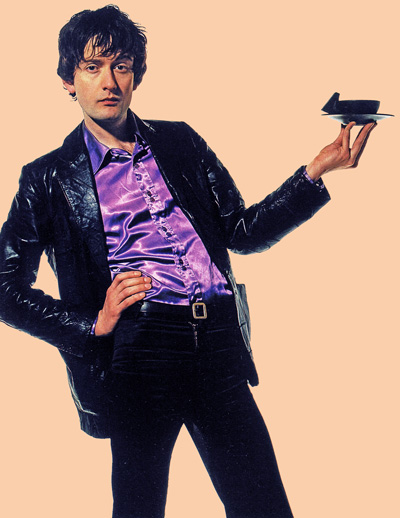Words: Andy Gill, Photographer: Michael Birt
Taken from Q Magazine, May 1994
Cue: elaborate frocks, a cheeky
drop of punch, ballroom dancing, "Heads together! Smile,
please!" - it's Q's very own coming out ball. There is
no door code here, other than it's your first time in
the magazine. This month, we salute 14-year overnight
sensations, Pulp, Brit rap ambassadors, Urban Species
and Californian nutters, Swell. Take your partners.
Poised on the brink of widespread success after nearly 14 years as linchpin of Sheffield glum-rock combo Pulp, Jarvis Cocker muses upon the long and tortuous route to public acceptance which has faced his group - together since schooldays - and which necessitated his departure from the one-time Steel City.
"There are a lot of interesting, intelligent people in Sheffield with a lot of ability," he says, "but unfortunately there's not that many opportunities to express that in Sheffield, and a lot of people move away, or get stifled. Often they end up settling for second best. It's not that they don't have aspirations, it's that it's not always possible to get what you want.
"That was the terrible thing for me: I left school to be in the band, I didn't go to university though I could have, I stayed and did it for five years without anything happening, so I was having to face the terrible possibility that I'd made a mistake."
Eventually, though, a succession of releases, particularly the splendid trio of singles recorded between June '92 and February '93 for Sheffield indie label Gift (collected together on their Island debut, Pulp Intro), chipped away at public indifference enough to have them tacked on to the tails of last year's Suede-led '70s revival. If anything, though, Pulp are more like The Fall, with a similar affection for weedy keyboard sounds and churning riffs, an eye for the telling period detail, and a suburban-dystopia world view that's only a Pennine pass removed from Mark E. Smith's Mancunian milieu.
Where Smith recollects in surreal bitterness, however, Cocker offers a more intelligible, sardonic approach to his characters' lives. Take the narrator of Babies, who, Blue Velvet-style, hides in his girlfriend's sister's wardrobe and has to have sex with her when she discovers him there ("I only went with her 'cos she looks like you," he tells his girlfriend). Or the eponymous heroine of the three-part opus, Inside Susan, originally glimpsed at a bus-stop "in your crochet halter-top and your sky-blue trainer bra", whose aspirations and zest for life are slowly ground down until, by the song's conclusion, she's stuck in a stale but comfortable marriage to an architect: "All things being considered you'd call it a success," notes the narrator drily.
Cocker's lyrics share with those of Costello, or Difford & Tilbrook at their best, the kind of pleasing narrative arc and last-act pay-off we associate with well-sculpted drama, but he's less judgemental, certainly, than Costello, exhibiting instead the kind of sad affection for his characters that Mike Leigh specialises in. Typically, though, Cocker is too lazy to be bothered writing an actual full-length play. "That's the good thing about writing songs," he says, "I like the fact that it's quite concentrated, without moving into the poncedom of poetry."
Having originally chosen band over university, Cocker and bassist Steve Mackey redressed the balance when they moved to London, enrolling at St Martin's School Of Art and learning how to make films. Commissions for video work followed, from such as Sweet Exorcist, Tindersticks and The Aphex Twin - "We never actually met him; he sent a cardboard cut-out of himself along. So he was very easy to work with," More recently, besides doing the usual promotional video for the new Pulp single, Do You Remember The First Time?, the pair embarked upon a 25-minute film to accompany the video, in which, echoing the American documentary Heavy Petting, various celebs, including John Peel, Jo Brand, Vic & Bob, Alison Steadman, Viv Stanshall and Justine Frischman of Elastica, reveal how they lost their virginity. Fun Boy Terry Hall, himself every bit as dry as Cocker, has the best line: "She was into the Bay City Rollers, which put me off a bit. But not enough."
The subject seems tailor-made for Cocker, whose songs betray a special acuity regarding the hopes and disillusionments of adolescence. They're not, however, the product of personal experience. "I was quite shy when I was a kid, so I never really went through all the things that I write about," he claims. "I didn't actually manage to have sex till I was almost 20, so I never did it while I was at school. I mean, I'd go to parties and try to cop off with girls and stuff - I wasn't a hermit - but I think the reason I started writing about it was that I thought I might be in danger of forgetting what it was like.
"Also, I liked the resilience of youth; people are always packing each other when they're young - you'd be going out with someone and one day they'd say, 'I'm packing yuh, yuh're a right slag", and nobody would think anything of it, whereas if you said that to someone now, you'd be in the divorce courts, getting sued. I liked the fact that everybody was so insensitive to each other, and quite abusive a lot of the time. It's a sign of immaturity, I'm sure."
